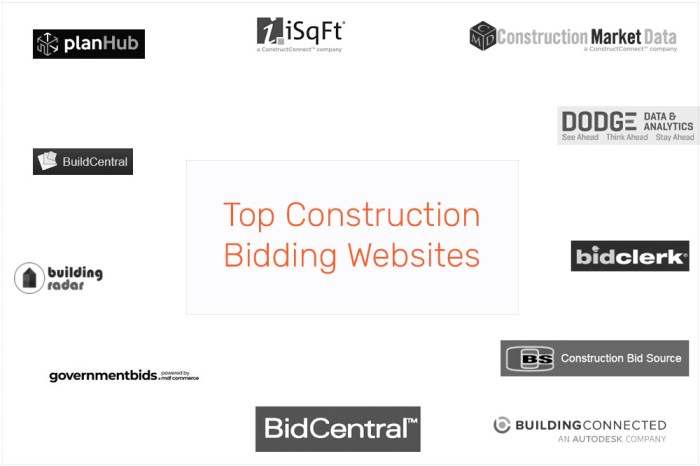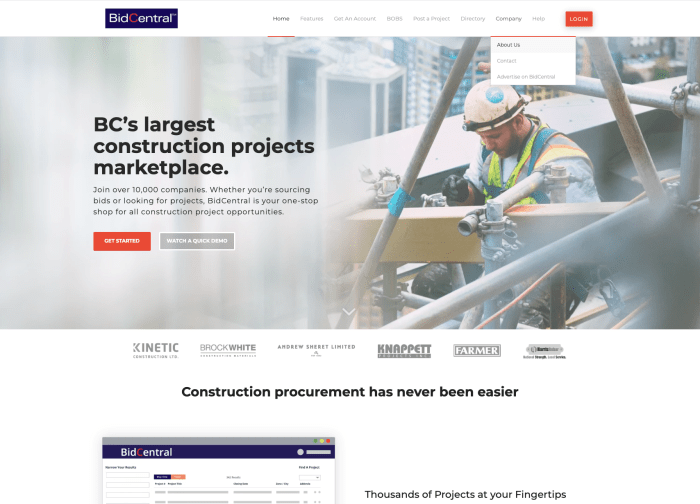Diving into the world of construction bid sites, this guide offers a detailed look at how these platforms operate and their significance in the construction industry. From understanding the basics to exploring advanced trends, this article covers it all in a manner that is informative and engaging.
In the following sections, we will delve into the types of construction bid sites, effective strategies for using them, current trends shaping the industry, and more.
What are Construction Bid Sites?
Construction bid sites are online platforms that connect contractors and clients in the construction industry. These websites allow contractors to submit bids for projects posted by clients, who can then compare proposals and select the most suitable contractor for the job.
Key Features of Construction Bid Sites
- Project Listings: Clients can post details of their construction projects, including budget, timeline, and requirements.
- Bid Submission: Contractors can submit their proposals, including cost estimates, project timelines, and relevant experience.
- Communication Tools: Bid sites often provide messaging or chat features for easy communication between clients and contractors.
- Review System: Clients can rate and review contractors based on their past performance, helping others make informed decisions.
Benefits of Using Construction Bid Sites
- Increased Visibility: Contractors can reach a larger audience of potential clients, expanding their business opportunities.
- Streamlined Process: Clients can easily compare bids and select the best contractor for their project, saving time and effort.
- Competitive Pricing: Contractors can submit competitive bids to win projects, while clients can receive multiple offers to choose from.
- Transparency: The use of bid sites promotes transparency in the bidding process, ensuring fairness and accountability.
Types of Construction Bid Sites
When it comes to construction bid sites, there are various types that cater to different needs and preferences within the industry. Let's explore the key distinctions between public and private bid sites, local versus national platforms, the advantages and disadvantages of specialized bid sites, and some popular examples in the construction sector.
Public vs. Private Construction Bid Sites
Public construction bid sites are open to anyone and typically involve government-funded projects or contracts. These platforms provide transparency and equal opportunities for all contractors to bid on projects. On the other hand, private construction bid sites are restricted to specific members or subscribers, offering a more exclusive environment for bidding on projects.
While public sites promote competition and fairness, private sites may focus on building relationships and fostering collaboration within a select group of contractors.
Local vs. National Construction Bid Sites
Local construction bid sites concentrate on projects within a specific region or area, allowing contractors to target opportunities in their immediate vicinity. These platforms can help smaller businesses access local projects and establish a presence in their community. In contrast, national construction bid sites cover projects across the entire country, offering a broader scope of opportunities for contractors looking to expand their reach and take on larger-scale projects.
Local sites provide a more targeted approach, while national sites offer diversity and access to a wider range of projects.
Specialized Construction Bid Sites
Specialized construction bid sites focus on specific types of projects or sectors within the industry, such as commercial, residential, civil engineering, or infrastructure projects. These platforms cater to contractors with expertise in a particular area, allowing them to connect with relevant projects and clients.
While specialized bid sites can provide more tailored opportunities and connections, they may limit the overall exposure to a broader range of projects compared to general construction bid sites.
Popular Examples of Construction Bid Sites
BidClerk
A comprehensive platform offering a wide range of construction projects across different sectors and locations.
ConstructConnect
Provides access to a vast network of construction opportunities, including project leads, bid documents, and industry insights.
Dodge Data & Analytics
Offers construction project data and insights to help contractors identify and pursue new business opportunities.
iSqFt
A leading construction bid management platform that connects contractors with projects and subcontractors for streamlined bidding processes.These examples showcase the diverse range of construction bid sites available in the industry, each serving unique purposes and catering to specific needs of contractors and construction professionals.
How to Use Construction Bid Sites Effectively

Effective utilization of construction bid sites is crucial for contractors aiming to secure projects and expand their business opportunities. By following the steps below and implementing the tips provided, contractors can enhance their chances of success on these platforms.
Submitting Bids on Construction Bid Sites
- Register and create a detailed profile showcasing your expertise, experience, and past projects.
- Review available projects carefully, ensuring they align with your capabilities and resources.
- Prepare a competitive bid proposal with accurate cost estimates, timelines, and project deliverables.
- Submit your bid before the deadline, ensuring all required documents and information are included.
Tips for Winning Bids on Construction Bid Sites
- Highlight your unique selling points and competitive advantages in your bid proposals.
- Provide clear and concise communication throughout the bidding process to build trust with clients.
- Offer competitive pricing while maintaining quality standards to stand out from other bidders.
- Follow up on submitted bids and engage with clients to demonstrate your interest and commitment.
Role of Technology in Streamlining the Bidding Process
- Utilize construction bid site platforms with user-friendly interfaces and advanced search features to find relevant projects quickly.
- Leverage digital tools for cost estimation, project management, and collaboration to streamline the bidding process.
- Explore automated bid submission systems to increase efficiency and reduce manual errors in the bidding process.
Common Mistakes to Avoid on Construction Bid Sites
- Submitting incomplete or inaccurate bid proposals that lack essential details or clarity.
- Overlooking project requirements and submitting generic bids that do not address the client's specific needs.
- Neglecting to follow up on submitted bids or failing to communicate effectively with clients throughout the bidding process.
- Ignoring feedback from unsuccessful bids and not using it to improve future bidding strategies.
Trends in Construction Bid Sites

The construction industry is constantly evolving, and construction bid sites are no exception. With the advent of digitalization, artificial intelligence, and mobile applications, these platforms have seen significant transformations that are shaping the future of the industry.
Impact of Digitalization
Digitalization has revolutionized the way construction bid sites operate. It has streamlined the bidding process, making it more efficient and accessible to a wider range of contractors. With digital platforms, contractors can easily submit bids, track progress, and communicate with project owners in real-time.
Artificial Intelligence in Bidding Process
Artificial intelligence (AI) is playing a crucial role in transforming the bidding process on construction bid sites. AI algorithms can analyze vast amounts of data to provide accurate cost estimates, identify potential risks, and even suggest alternative materials or methods to optimize the project.
This not only saves time but also improves the accuracy of bids, leading to better project outcomes.
Mobile Applications for Accessing Bid Sites
The emergence of mobile applications has made accessing construction bid sites more convenient than ever. Contractors can now view project details, submit bids, and communicate with stakeholders on the go, increasing efficiency and productivity. Mobile apps also offer features like push notifications and alerts, keeping users informed about new projects and bid opportunities in real-time.
Future Trends in Construction Bid Sites
Looking ahead, we can expect construction bid sites to continue evolving with advancements in technology. Predictions suggest that virtual reality and augmented reality will play a more significant role in visualizing projects, allowing contractors to immerse themselves in the project before bidding.
Additionally, the integration of blockchain technology may enhance transparency and security in bid submissions, creating a more trustworthy environment for all stakeholders involved in the construction process.
Summary

In conclusion, construction bid sites play a pivotal role in modern construction practices, offering a streamlined way for contractors and clients to connect and collaborate. As technology continues to evolve, these platforms will undoubtedly witness further enhancements, reshaping the future of construction bidding.
Detailed FAQs
What are Construction Bid Sites?
Construction bid sites are online platforms where contractors can submit bids for construction projects, and clients can review and select the most suitable offer.
How do I effectively use Construction Bid Sites?
To use construction bid sites effectively, contractors should ensure their bids are detailed, accurate, and submitted in a timely manner. Additionally, staying updated on project listings and engaging with clients can improve chances of winning bids.
What are the key features of Construction Bid Sites?
Key features of construction bid sites include project listings, bid submission tools, communication channels between contractors and clients, and secure payment systems.
What are the trends in Construction Bid Sites?
Current trends in construction bid sites include digitalization of the bidding process, integration of artificial intelligence for bid analysis, development of mobile applications for easy access, and the prediction of future enhancements in the industry.














